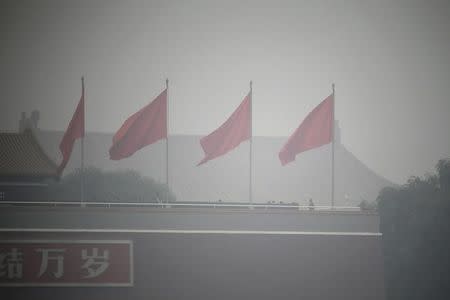China's growth-obsessed officials ignoring green policies - parliament

BEIJING (Reuters) - Local officials determined to make their economies bigger at any cost are ignoring Beijing's push to cut hazardous air pollution, opting instead to expand heavy industries and cut clean energy from the grid, a Chinese parliamentary report said. The Standing Committee of the National People's Congress, China's parliament, dispatched a team of inspectors to 10 cities and provinces from May to September to oversee the implementation of new pollution policies. The team found some local officials continued to pursue GDP growth at the expense of the environment, according to details published on China's parliament website (www.npc.gov.cn). "Some local governments have not fulfilled their responsibilities to improve air quality," the report said. "In some locations, enforcement is not stringent or no punishment is imposed on violators." The capital is braced for more heavy smog, although hundreds of industrial sites are being shut to ensure the air is cleaner during an Asia-Pacific Economic Cooperation (APEC) summit in Beijing next week. China has issued a flurry of policy directives since Premier Li Keqiang launched a "war on pollution" earlier this year. It has also vowed to end a growth-at-all-costs economic model and pay more heed to the impact of industry on the environment. But the slowdown in GDP growth is piling pressure on Communist Party officials. "Local governments are suffering from a loss of jobs and taxation and to some extent they want to keep industries running, so there is a mixed response," said Tao Wang, a climate expert at the Carnegie-Tsinghua Center for Global Policy. "In general the economic slowdown is good news for pollution ... but the government still needs to move in the right direction to persuade (local authorities) to change," he said. Beijing has ordered provinces to cut capacity in polluting sectors such as steel but inspectors found that in some regions, which it did not identify, capacity was still being added. The report also said that coal consumption, the major cause of China's smog problems, continued to grow rapidly, while electricity from renewable sources such as solar and wind was not even being connected to the grid in some cases. The report backs up findings from the Ministry of Environmental Protection this month, which said that some regions of the heavily polluted province of Hebei were not taking their environmental responsibilities seriously enough. The ministry said that during a heavy bout of smog that hit Beijing and surrounding regions on Oct. 8, some local governments in Hebei were guilty of pursuing "form over substance" when it came to implementing anti-pollution policies. Hebei officials have complained that they are bearing too much of the burden for cutting pollution. The province has set an 8 percent growth target for 2014, but it stood at just 6.2 percent in the first three quarters. China has adopted a new environmental law that gives local authorities more power to punish wrongdoers, but it only comes into force at the start of next year. "I think a lot of the people trying to enforce these policies are looking at next year's law to come into place," said Calvin Quek with Greenpeace East Asia. At the moment, local officials simply lack the authority to ensure everyone follows Beijing, he said. (Reporting by Kathy Chen, David Stanway and Stian Reklev; Editing by Alan Raybould)

